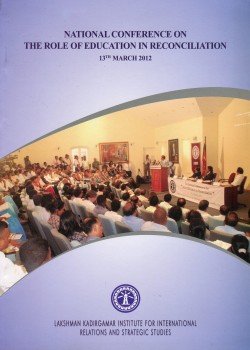
National Conference on the Role of Education in Reconciliation
13th March 2012
Publisher: Lakshman Kadirgamar Institute for International Relations and Strategic Studies
Place of Publish: Sri Lanka, Colombo
Year: 2012
Page Numbers: 38
Acc. No: 4579
Class No: 370 NAT-SL
Category: Books & Reports
Subjects: Adult Education
Type of Resource: Monograph
Languages: English
The Lakshman Kadirgamar Institute for International Relations and Strategic Studies (LKIIRSS) in its series of conferences to promote reconciliation convened the National Conference on the Role of Education in Reconciliation on the 13th of March, 2012. Eight distinguished speakers from the education field shared their experiences, thoughts and views on the contribution to national reconciliation through education. The focus of this third conference in the series of conferences on the theme of national reconciliation was the ways in which education can contribute to changing attitudes and perceptions among all segments of society, especially the future generations of Sri Lanka. It was the collective view of the speakers at the conference that fundamental reformations to the school system are required to produce future generations that are respectful towards differences in individuals, are united and will benefit from an enriched education which includes the learning of values and ethics, in order to move forward towards the shared goal of a peaceful nation. It is imperative that the multi-dimensional component of reconciliation be incorporated into the school and university syllabuses, and the competing narratives of history are re-adjusted. It is essential that a training program for educators be commenced to sensitize teachers to the needs of reconciliation, a democratic learning environment, and empowerment of students, especially as teachers act as role models for students. Education is a critical tool in establishing Sri Lanka's path towards long-term reconciliation. Education can be used to promote tolerance, co-existence, and moderation. After a conflict - inter-ethnic, inter-religious, internal or external - reconciliation through education is a vital call. Education offers the chance to shape minds, hearts, and behaviors of succeeding generations. Education must be holistic and account for its various dimensions, including linguistic diversity and developing the qualities of empathy, non-violence, tolerance, respecting others, knowledge and understanding of other cultures and faiths, peace, and love. Promotion of such values, attitudes, and behavior directs communities towards creating a harmonious, stable, and secure society. This transformation of values will aid in the process of healing and reconciliation, increasing cooperation between individuals and communities to achieve the national goals of peace, prosperity, and wellbeing of all citizens.



